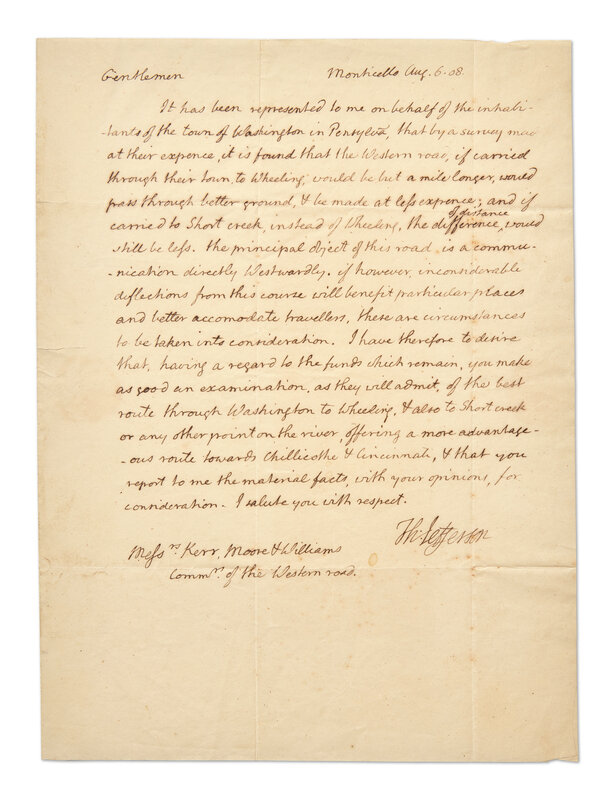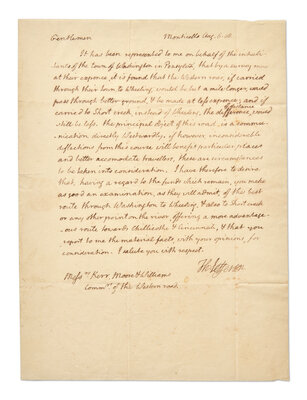Condition Report
Contact Information
Auction Specialist
Lot 37
Jefferson, Thomas. Autograph Letter, signed
Sale 6308 - Printed and Manuscript Americana
Jan 29, 2025
10:00AM ET
Live / Philadelphia
Own a similar item?
Estimate
$25,000 -
35,000
Price Realized
$32,000
Sold prices are inclusive of Buyer’s Premium
Lot Description
Jefferson, Thomas. Autograph Letter, signed
On the National Road, the First Large-Scale Federal Infrastructure Project in the United States
Monticello, August 6, 1808. One sheet, 9 3/4 x 7 1/4 in. (248 x 184 mm). One-page autograph letter, signed by Thomas Jefferson as President of the United States, to Joseph Kerr, Thomas Moore, and Eli Williams, Commissioners of the Western Road (also known as the National Road and Cumberland Road), regarding their survey of what would become the United States' first national highway. Creasing from when folded, short separations along same; scattered minor spotting; light abrasion and soiling on rear from seal. Published in The Writings of Thomas Jefferson, Vol. XII, p. 117 (Bergh, Washington, D.C., 1907).
"Gentleman
It has been represented to me on behalf of the inhabitants of the town of Washington in Pensylv'a, that by a survey made at their expence, it is found that the Western road, if carried through their town, to Wheeling, would be but a mile longer, would pass through better ground, & be made at less expence; and if carried to Short creek, instead of Wheeling, the difference of distance would still be less. The principal object of this road is a communication directly Westwardly. if however, inconsiderable deflections from this course will benefit particular places and better accommodate travellers, these are circumstances to be taken into consideration. I have therefore to desire that, having a regard to the funds which remain, you make as good an examination, as they will admit, of the best route through Washington to Wheeling, & also to Short creek or any other point on the river, offering a more advantageous route towards Chillicothe & Cincinnati, & that you report to me the material facts, with your opinions, for consideration. I salute you with respect.
Th: Jefferson"
Messrs. Kerr, Moore & Williams
Commrs. of the Wester road."
A rare letter from Thomas Jefferson on his stewardship of the United States' western expansion, writing to the commissioners of the Western Road, the first federally funded national road in the United States and the basis for America's interstate highway system.
On March 29, 1806 Congress empowered President Jefferson to lay out a federally funded road from the Potomac River to the Ohio River. Under the terms of the Treaty of Paris that ended the American Revolution, the United States acquired from Great Britain vast territory west to the Mississippi River. This new frontier was welcomed by Americans seeking opportunity and fortunes, but brought challenges in creating and sustaining the bonds--both commercially, politically, and socially--between these new and expanding western settlements and those along the nation's more populated Atlantic seaboard.
The Congressional Committee that authorized the construction of the Western Road (also referred to as the National and the Cumberland Road) made explicit the importance of such an endeavor for the nation's prosperity, stating in an 1805 report that, "Politicians have generally agreed that rivers unite the interests and promote the friendship of those who inhabit their banks; while mountains, on the contrary, tend to disunion and estrangement of those who are separated by their intervention. In the present case, to make the crooked ways straight, and the rough ways smooth, will, in effect, remove the intervening mountains, and by facilitating the intercourse of our Western brethren with those on the Atlantic, substantially unite them in interest, which, the committee believe, is the most effectual cement of union applicable to the human race." The Road bill passed by Congress allocated $30,000 for its completion, and empowered Jefferson to appoint a board of "three discreet and disinterested" individuals to survey and supervise the Road's construction. Later that same year Jefferson appointed the recipients of the above letter, Joseph Kerr, Thomas Moore, and Eli Williams, to carry out the monumental project.
As this letter relates, issues concerning the Road's location sprung up immediately, primarily in Pennsylvania. Under the 1806 Bill authorizing the Road, construction of the highway required the approval of the three states through which it would pass: Pennsylvania, Maryland, and Virginia. While Maryland and Virginia quickly assented to the construction, Pennsylvania was not so easily compliant, as they viewed the proposed project as benefitting Baltimore--Philadelphia's main commercial rival--and sought to determine the location of the route. Seeking to make the route more advantageous to their interests, they requested Jefferson consider running the road through the town of Washington, which was not on the route originally recommended by the three commissioners. While Jefferson was reluctant to adopt the more indirect route, political matters weighed on his decision, as the town was a staunchly Republican community in his Treasury Secretary Albert Gallatin's former Congressional district. Not wanting to be perceived as making an overtly political decision on the matter, Jefferson here instructs the commissioners to make their own investigation on the matter, and asks them to "make as good an examination, as they will admit, of the best route through Washington to Wheeling, & also to Short creek or any other point on the river, offering a more advantageous route towards Chillicothe & Cincinnati, & that you report to me the material facts, with your opinions, for consideration." Although the commissioners eventually rejected the route through Washington as being too circuitous, later in 1820 President James Monroe would sign a bill allocating funds for the Road's construction through the town.
Construction of the Road began in 1811 in Cumberland, Maryland following the old Braddock Road, and by 1818 had been completed to the Ohio River at Wheeling, West Virginia (then in Virginia). Following its opening, it served as a gateway to the west for thousands of travelers who settled in the Ohio River Valley and beyond. As a result, several small towns popped up along the route, leading to the Road's nickname as "the main street of America". During the first half of the 19th century the road was extended through Ohio, Indianapolis, St. Louis, and eventually to Kansas City and Denver, and today is largely followed by US Highway 40. It has since come to be known as "the road that built the nation."
According to RBH, this is the only letter from Thomas Jefferson, completely in his hand, regarding the Western Road to appear at auction in nearly 50 years.
This lot is located in Philadelphia.

